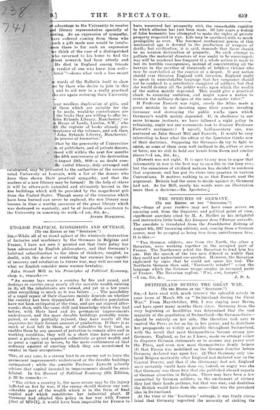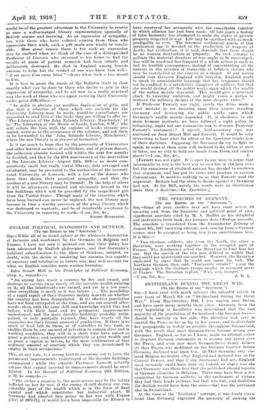SWITZERLAND DURING THE GREAT WAR.
- ITO THE EDITOR or THE SFECIATOR."3
have read with much interest the splendid article in your issue of March 8th on "Switzerland during the Great War." From May-October, 1914, I was staying near Berne, and have.spent many months there since. Germany from the very beginning of hostilities was determined that the vast majority of the population of Switzerland—the German-Swiss- should be entirely on her side. She therefore took care to control the Press as far as lay in her power, and to distribute her propaganda as widely as possible throughout Switzerland. with the result that most German-Swiss became strong pro- Germans. England, as for as I know, made no attempt either to disprove German. statements or to assume any power over the Press, and even now most German-Swiss firmly believe (1) that Russia was mobilized on the German frontier before Germany declared war upon her. (2) That Germany only vio- lated Belgian neutrality after England had declared war on the Central Powers, and that if she (Germany) had not, Englund most certainly would have done co; indeed, on angry was ehe that Germany was there first that she published absurd reports of German atrocities in Belgium. There may have been a few committed by German soldiers, in the excitement of victory they lost their heads perhaps, but that was war, and doubtless the British would have done the same—that was the prevalent idea in Switzerland.
At the time of the Lusitania ' outrage, it was freely circus fated that Germany regretted the necessity of sinking the would be-of:the greatest advantage to the University to receive at once a well-arranged library representative specially of British. seience awl learning. As an repression of sympathy; too, with those who have suffered coming from those who appreciate their work, such a gift mode now would he invalu- able. Now greet reason there is -for such an expression may be realized when we think of the ease of a distinguished Professor of Louvain who returned to his home to find the results of years of pntient research had been utterly and deliberately destroyed. He died in England among friends anxious to help, but the verdict of one. who knew him well- " it est meet (Pun (tem brim; "—shows what such a lose meant to him.
It is beet to quote the words of the Bulletin itself to show exactly what can be alone by those who desire to join in this expression of sympathy, and to aid now in a really practical way.the work of those whortre again restoring their University tinder great difficulties:—
" In order to obviate tiny needless duplication of gifts, and also that a. selection of these whieh are suitable for the University Library may be made, would-be contributors are requested to send lists of the books they are willing to offer to ' The Librarian of the John Ifylands Library, Manchester,' or to ` The Librarian of the House of Lords, London, S.W.,' who will collate the lisle with the register of books already pre- sented, write as to the acceptance of the volumes, and ask them to be forwarded to the John Its-lands Library, Manchester,' where the new library is in process of formation."
Is it too much to hope that by the generosity of Universities and-other learned societies, of publishers, and of private donors, the collection already formed will within the next few months be doubled, and that by the fifth anniversary of the destruction of the Louvain Library—August 25th, 1919—a no doubt corn- Iteratively small but really useful library, duly arranged and catalogued, may be presented to the authorities of the reconsti- tuted University at Louvain, with a list of the donors who have thus shown their practical sympathy. and that the nucleus of a new library may he formed? By the help of others it will be afterward:: extended and ultimately housed in the line buildings which will be provided by the magnificent gift from the United States. Though many of the treasures which have been burned can never be replaced, the new library may become in time a worthy suocessor of the great library which was destroyed co wantonly, and be of invaluable assistance to the University in renewing its work.—I am, Sir, &e., • ALFRED HOPKINSON.




































 Previous page
Previous page